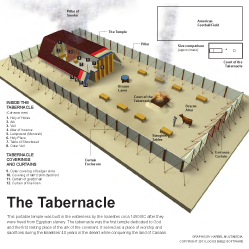6:1–5 The offenses listed here seem to involve deliberate offenses, not inadvertent errors (see note on 5:14–Lev 6:7). The three offenses described in vv. 2–3—deliberate deception in a contractual relationship, outright theft, and oppression of a fellow Israelite—all deal with greed. Before the offender could be forgiven, they had to make restitution—the value of the property plus an extra 5th of its value. |
6:2 he deceives his fellow citizen These concerns are specifically focused on relationships with a person’s “neighbor.” The Israelite was to love his neighbor as himself (19:18).
6:4 is guilty The Hebrew verb used here, asham, indicates the person is guilty and willing to make amends, thus it is often translated here in a way that reflects people coming to realize their guilt.
6:5 shall add one-fifth of its value to it Making full reparation required paying the principle plus an additional fifth of the value.
6:6 a guilt offering See note on 5:14.
6:8–7:38 This passage provides additional instructions for the priests regarding how to handle the various sacrifices and offerings. One of the main concerns of the passage is the protocol for distributing and eating portions of the offerings. The major offerings discussed in chs. 1–5 are mentioned again here—sometimes providing new information and sometimes repeating details given earlier. For example, the discussion of the burnt offering here adds details about disposing of the ashes and about how a burnt offering should be burning on the altar continually (vv. 9–13). By contrast, the discussion of the grain offering in vv. 14–18 essentially repeats the information from 2:1–3. Most of the new information provided about the offerings relates to which priest gets the priestly portion. Typically, the priest who officiates over the sacrifice receives the meat (vv. 26, 29; 7:7). |
 Types of Offerings in the Old Testament Table
Types of Offerings in the Old Testament Table
6:9 the burnt offering Burnt offerings were offered to make atonement and played an important part in public worship (Num 28–29). The offering served to restore relationship to God or to please God. Burnt offerings also played a role in the procedures for cleansing various ritual impurities (e.g., Lev 12:6–7; 14:19–20; 15:30). See 1:1–17; and note on 1:3.
all night until the morning The altar was to be kept burning continually with a burnt offering. See note on 1:3–17.
6:12 must be kept burning See note on v. 9.
6:14 the grain offering Grain offerings were mixed with oil and frankincense and a token amount was burned on the altar. Compare 2:1–3.
6:15 finely milled flour The Hebrew word used here, soleth, probably refers to wheat flour (compare Exod 29:2). The term is also used in 2 Kgs 7:16, where an explicit distinction is made between soleth and se'orah (barley). Based on the economic context of 2 Kgs 7:16, it appears that wheat usually cost twice as much as barley. Soleth also seems to be high quality flour as opposed to ordinary flour (qemach in Hebrew; compare 1 Kgs 4:22).
6:16 they must eat it as unleavened bread in a holy place The priests could eat the rest of the offering aside from the token amount burned on the altar. The meal had to be eaten in a sacred area—the courtyard of the tabernacle.
6:17 a most holy thing Certain offerings could only be eaten by the priests because of the holiness of the offering. The grain offering was like two other offerings in that only priests were eligible to eat from it: the chatta’th (sin or purification) and the asham (reparation, restitution, or guilt).
6:18 will become holy Not in the sense of moral purity, but in the sense of being set apart.
6:19–23 This passage is specifically about the grain offering that is to be offered when one of Aaron’s descendants is anointed as the next high priest (Lev 6:22; compare 21:10). Aaron is anointed as the first high priest in Exod 29:7 (compare Lev 8:12). The offerings associated with the ordination of Aaron and his sons included grain offerings and animal sacrifices (Exod 29:1–3). |
6:20 his being anointed Aaron and his four sons were anointed when they were ordained as priests (see Lev 8:12, 30). According to 21:10, the chief priest was the anointed one, suggesting that anointing was only part of the ordination ceremony for future high priests, not all priests. Compare Exod 28:41; 29:21; 30:30; 40:13–15.
6:24–30 Only the purification (sin) offerings described in Lev 4:22–35 could be eaten. The procedure for the offerings in 4:1–21 involved bringing some of the blood inside the tent, giving those sacrifices a higher level of sanctity and making them ineligible for consumption (v. 30). |
6:28 a clay vessel The meat of the sacrifice made whatever it was cooked in holy. If the meat was cooked in a breakable container, then the container had to be destroyed after cooking. If it was cooked in a metal container, it had to be washed thoroughly.

|
About Faithlife Study BibleFaithlife Study Bible (FSB) is your guide to the ancient world of the Old and New Testaments, with study notes and articles that draw from a wide range of academic research. FSB helps you learn how to think about interpretation methods and issues so that you can gain a deeper understanding of the text. |
| Copyright |
Copyright 2012 Logos Bible Software. |
| Support Info | fsb |
 Loading…
Loading…


